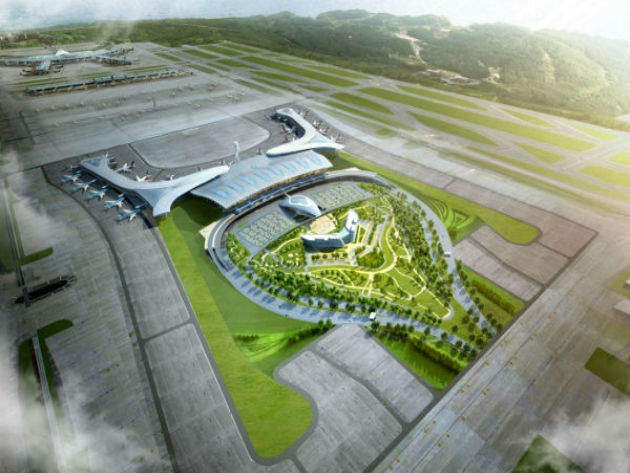
This year, South Korea’s Incheon International Airport was presented with the Airport Service Quality (ASQ) award for an unprecedented eleventh time. The award, given by the Airports Council International (ACI) every year since 2006, was based on approximately 550,000 passenger surveys sent to 268 airports worldwide.
Speaking earlier this year, Incheon Airport CEO Chung Il-young said: “Winning the highest honour at the ASQ Awards for 11 straight years is something no other airport in the world has achieved so far.”
Incheon’s place as of one of the world’s finest airports was further underlined this year when the Skytrax World Airport Awards gave it top spot in its list of the world's best airports for transit passengers, as voted for by travellers.
Such success could be cause for complacency, but not at Incheon. In September 2013, the airport broke ground on a $2.5bn project to construct a second terminal as part of a $4.5bn construction package to address growing passenger demand.
Chung Il-young also has plans to upgrade baggage handling and add 50 new check-in counters by 2020, telling the Korea Herald in March last year that some facilities had “grown old, and must be restored and maintained,” adding: “On the software side, we want to become a smart airport that makes good use of information technology.”
Some of this can be seen already, following the announcement that Incheon and LG Electronics have signed a memorandum of understanding to use autonomous robots for cleaning and information purposes, as PyeongChang prepares to host the 2018 Winter Olympics, putting pressure on Incheon’s ability to effectively manage large numbers of international passengers. Chung Il-young has called it a “blue ocean” of opportunity for the industry.
Nevertheless, it is Terminal 2 – its size, scope and price tag – that really represents Incheon’s bold vision for the future.
South Korea’s gateway to the world

Built to replace Gimpo International Airport, Incheon officially opened in 2001, five years after the start of construction on the terminal building. Little by little, it has climbed up the ranks to become one of the world’s foremost air hubs. The airport’s official website says it is the world’s third busiest international cargo handler, but there are plans afoot to increase its annual freight volume to three million tons by 2020, while also constructing a new terminal specifically for FedEx cargo.
Incheon hosts 90 airlines, serving 186 destinations. Approximately 49 million passengers came through the doors last year, but this is still some way off the likes of Dubai, Hartsfield–Jackson Atlanta International Airport, and London Heathrow. However, there is little doubt that it is South Korea’s gateway to the world.
The third phase

Consolidating this position, as well as making inroads on regional rivals such as Beijing and international competitors, falls on the shoulders of Terminal 2.
This forms the focal point of Incheon’s third phase construction project, a $4.5bn undertaking that could see 72 million passengers and 5.8 million tons of cargo welcomed to the airport annually. This growth is seen as critical to Incheon’s hopes of becoming an airline hub.
Construction on Terminal 2 began in 2013 and it is scheduled to open to the public towards the end of 2017. It will host Korean Air and Sky Team.
Native Korean foliage

The design of the 72-gate, 7.4-million-square-foot terminal, finalised in 2012, comes from the HMGY (Heerim-Mooyoung-Gensler-Yungdo) consortium, with Gensler as the collaborating design architect.
Keith Thompson, of Gensler’s aviation division, was quoted by World Architect News in 2013: “We designed Terminal 2 to make travel at Incheon even more compelling, offering people unprecedented ease and convenience.”
Thompson added that his goal was to make the terminal “very intuitive to navigate”, featuring interior gardens of “native Korean foliage”. “Travellers will see this as the new benchmark for airports,” he said.
The terminal roof will also be fitted with solar photovoltaic panels to reduce energy consumption.
A different business environment

Terminal 2 will feature many of the standard amenties that passengers expect in modern airports: VIP lounges, concession and retail outlets, a transfer hotel, and so on.
Speaking to TRBusiness in April, Incheon’s deputy executive director of commercial marketing Kim Bum Ho outlined how international bids would be welcomed for duty free and other retail space tenders.
Later in the year, he also described how the retail layout of Incheon’s second terminal would differ from the first. “The business environment is different from terminal 1,” Kim told the The Moodie Davitt Report. “The size of the shops is less than a third of T1 – almost 10,000sq m. And the shops’ layout will be concentrated in the central area.”
In addition, Terminal 2 will include 222 check-in counters, 20 screening machines, 48 immigration departure machines, 62 immigration arrival machines, and ten baggage claim areas.
Terminal 2: challenging the best

As mentioned, Terminal 2 – despite its size and importance – is just one part of a bigger expansion plan.
It marks the starting point of the third phase construction project, which includes a new airport control tower, new train station and parking facilities, a conference centre and an airside intra airport transit – a 1.5km rail link to connect the arrival and departure levels of the terminal. Incheon’s Airport Express will also ferry passengers and staff between the two terminals.
After many years of planning and with many hopes pinned on it, Terminal 2 is almost ready. It remains to be seen if it will help Incheon International Airport realise the growth it so clearly desires and feels is necessary to challenge the hegemony of the world’s busiest airports.



